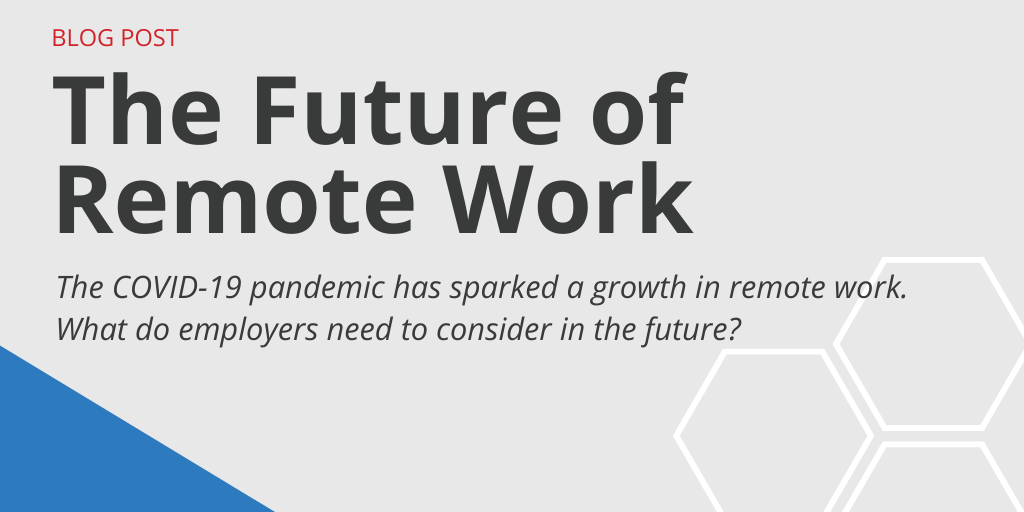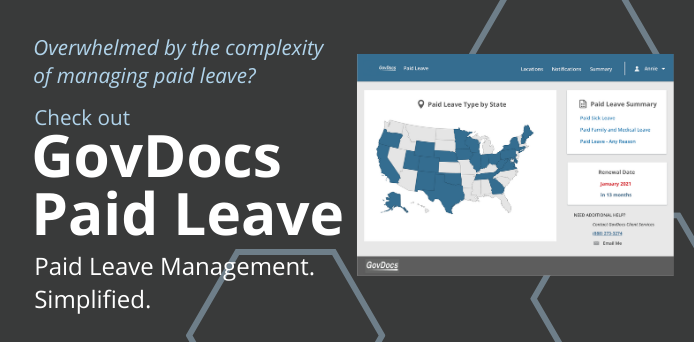EMPLOYMENT LAW NEWS
How Should Employers Handle the Future of Remote Work?
By Kris Janisch
Published Feb. 23, 2021

From typical work expenses to performance evaluations, employers have several items to consider when planning to move toward an at-home work model in the future.
What is the future of remote work?
COVID-19 has expanded the remote workforce, a trend that is expected to continue after the pandemic subsides. The situation brings with it several items for employers to consider.
A panel of employment law experts during a recent GovDocs webinar — What’s Up, 2021? A Look Ahead at Employment Law Trends — examined several matters employers must address should they decide to extend remote work.
Related: Can Employers Mandate the COVID-19 Vaccine?
The Future of Remote Work
From typical work expenses to performance evaluations, employers have several items to consider when planning to move toward an at-home work model.
Expenses
If employers opt to have employees work from home on a long-term basis, there may be added work-related expenses for employers to cover, said Dan Prokott, partner, Faegre Drinker Biddle & Reath LLP, and one of the webinar panelists. These requirements vary by state, and could include internet service, cell phone bill and even utilities.
“Those get to be a little more complicated and nuanced,” Prokott said.
Meanwhile, companies may also want to revisit the costs of their office footprint. With fewer employees on site, employers could consider reducing office space or dedicating areas for employees who may be in the office only occasionally.
Employee Performance
Because of the rapid onset of remote work during the pandemic, many employers have given workers a pass on performance.
That leeway will likely disappear if employees are working at home on a more permanent basis. Expectations have to be reset, said Kevin Mosher, one of the webinar panelists, a partner at Thompson Coe and founder of myHRgenius.
“It is going to be necessary for your business,” he said.
On the flip side, many managers may have strong in-person skills, but could struggle supervising a remote workforce. Employers may have to re-evaluate their management team or provide additional training.
Employee Location Matters
Another item for employers to consider with a remote workforce is where those employees live.
Do they work in different states or even countries?
“It is challenging,” Prokott said, adding that the best practice is to have employees in states where they already operate.
Taxes, local employment law, unemployment taxes — there are a host of implications with out-of-state (or country) employees. “Those are very real risks for employers to understand,” Prokott said.
Plus, paid leave laws can add a layer of complexity. Many laws cover only those employees who work a certain amount of time in a city each year. For example, if an employee works remotely in a nearby suburb and does not reach the hourly threshold of the city where the employer is located, the employer would arguably not have to apply paid sick leave benefits for that worker.
Connecting Employees
Finally, how can employers develop a sense of team when so many employees are working from home?
While technology (Zoom, Skype, etc.) can alleviate some of those concerns, employers may want to find creative ways to connect people, especially after the pandemic subsides.
Conclusion
There seems to be a light at the end of the tunnel when it comes to the COVID-19 pandemic. And many employers have discovered they can function with a remote workforce.
But if companies go down that road, there are additional employment law matters to consider. Businesses should develop plans now to be prepared for further remote work in the future.
This Employment Law News blog is intended for market awareness only, it is not to be used for legal advice or counsel.
Keep Informed
with GovDocs Employment Law News
Learn More About GovDocs
What is GovDocs?
GovDocs simplifies employment law compliance for large, multi-jurisdiction employers in the U.S. and Canada. The GovDocs software platform integrates three solutions in one convenient place to help you master the employment laws impacting your business. Whether you manage a postings, minimum wage or paid leave program, our products cut through research time, provide proactive insights into the everchanging landscape of employment laws and reduce the risk of noncompliance. The company is headquartered in St. Paul, Minn.
Have fewer than 30 locations?
The GovDocs Poster Store simplifies posting compliance for employers with less than 30 locations across all industries, offering a variety of posting products to meet your labor law compliance needs.



